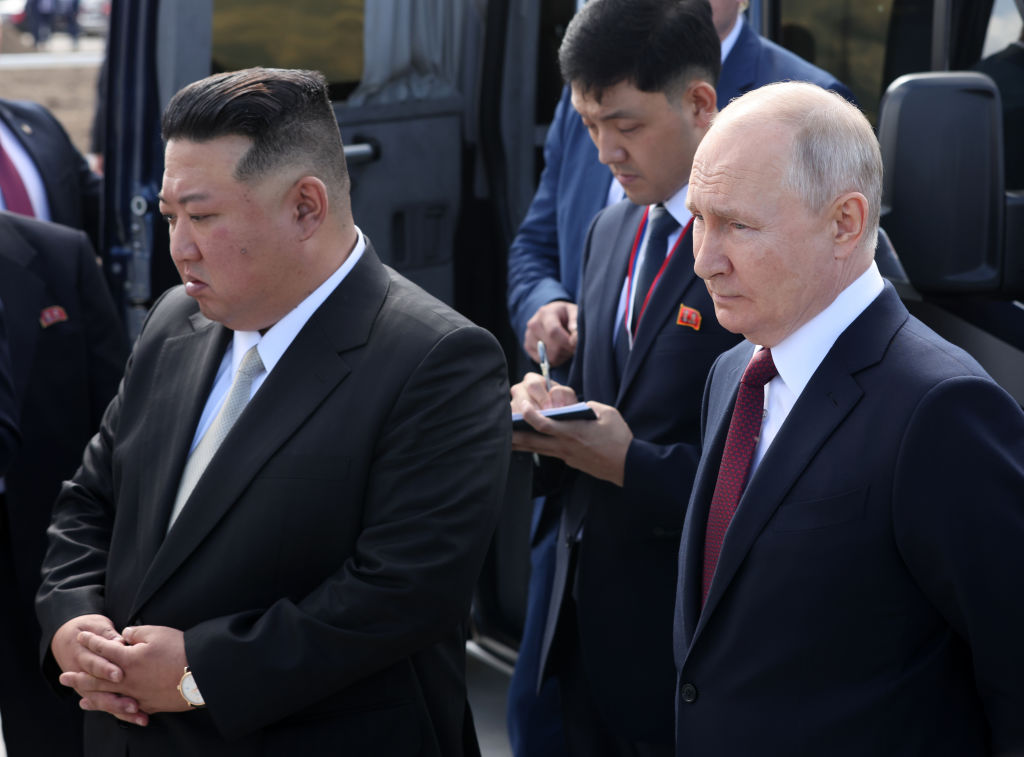
Russian President Vladimir Putin had obvious reasons for hosting North Korean dictator Kim Jong-un at Vostochny, Russia’s new spaceport in eastern Siberia, this month. Owing to his illegal war of aggression in Ukraine, Putin is running low on both friends and ammunition.
The Vostochny spaceport has a troubled history. Intended to replace the Baikonur facility in Kazakhstan, its construction was plagued by repeated delays and allegations of corruption and mismanagement. Now, it is rarely used—though it did launch the high-profile Luna-25 mission that crashed into the moon recently.
Russian–North Korean relations have a similar backstory. Once upon a time, the bond between the Kremlin and the Kim regime was tight. After all, communist North Korea was essentially a Soviet creation, and it relied heavily on Soviet support for decades. But following the collapse of the Soviet Union, Russian leaders saw more to gain by developing relations with booming South Korea. The Kremlin effectively switched sides, joining the (unsuccessful) international effort to prevent the hermit kingdom from developing nuclear weapons.
Now the situation has changed once again. Putin’s attempt to erase Ukraine from the map of Europe has made Russia an international pariah—just like North Korea. Most of the world’s developed economies have signed on to comprehensive sanctions against Russia, and the UN General Assembly has issued several resolutions condemning Putin’s war of aggression. The very few countries that have sided with Russia constitute an international rogues’ gallery: Eritrea, Syria, Nicaragua, Belarus, Mali and, of course, North Korea.
Meanwhile, many countries that have abstained from these UN votes have increasingly made known their objections to Putin’s war. At the recent G20 summit in New Delhi, for example, the final joint declaration included a clear affirmation of the principle of territorial integrity—an obvious reference to Russian aggression and the Kremlin’s misbegotten strategic objectives.
Putin expected a quick victory when he launched his war in February 2022, but Russian forces have since lost roughly half of what they captured during the initial invasion. After nearly 600 days, they are bogged down and struggling to defend themselves against an independent, democratic Ukrainian polity that is determined to defend its freedom.
Under these conditions, when Putin needs every friend he can get, North Korea is suddenly back in the Kremlin’s favour. With its thoroughly militarised society and abundant stocks of old Soviet-standard artillery ammunition, Kim’s regime looks like a lifeline for Russia’s flailing war effort.
Putin therefore had little choice but to roll out the red carpet for the North Korean dictator. Though the details of the Vostochny dealmaking will remain undisclosed, it’s safe to assume that Russia will get ammunition in exchange for various essentials that North Korea desperately needs, not least food and energy. Beyond that, there has also been talk of Russia assisting North Korea in developing and deploying satellites, an area in which it has been singularly unsuccessful.
Whatever the details, there can be little doubt that the deal violates the UN Security Council’s sanctions against North Korea, which were originally put in place with Russian support. In claiming that the North Korea sanctions regime is a UN matter, not a Russian one, Russian Foreign Minister Sergei Lavrov is being dishonest in the extreme.
We are witnessing the emergence of an axis of outcasts: countries united in their willingness to violate international law by starting wars, developing nuclear weapons and violating sanctions. This list also includes Iran, where Russia has been acquiring kamikaze drones with which to attack Ukrainian cities and civilians.
But make no mistake: reaching out to a country like North Korea is a sign of profound weakness. China and India might not openly condemn Russian aggression, but nor have they endorsed it or done much to help Putin’s war effort (other than purchasing Russian hydrocarbons). And whatever support Belarus, Eritrea, Syria or Mali is capable of offering, it will not help the Kremlin achieve the aims of its ‘special military operation’ in Ukraine.
Nonetheless, these outcasts, driven by desperation, will deepen their cooperation, introducing new risks to regional stability and the global order. For example, if Russia furnishes North Korea with the technologies it needs to advance its missile or nuclear program, it is bound to have repercussions for Northeast Asian security.
Russia and North Korea may be failing in their space efforts. But their sanctions-busting and rule-breaking here on earth are sure to have a destabilising effect on the international order.

